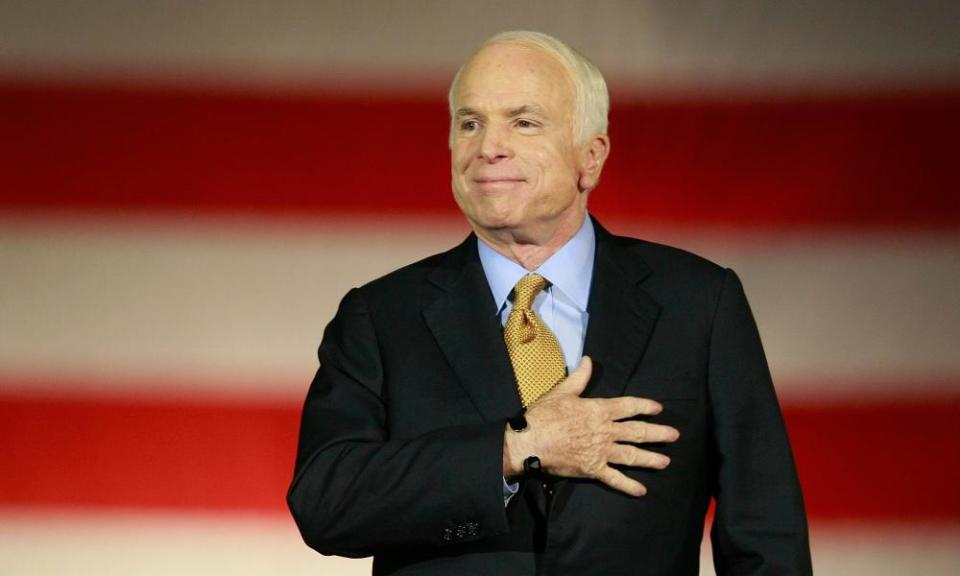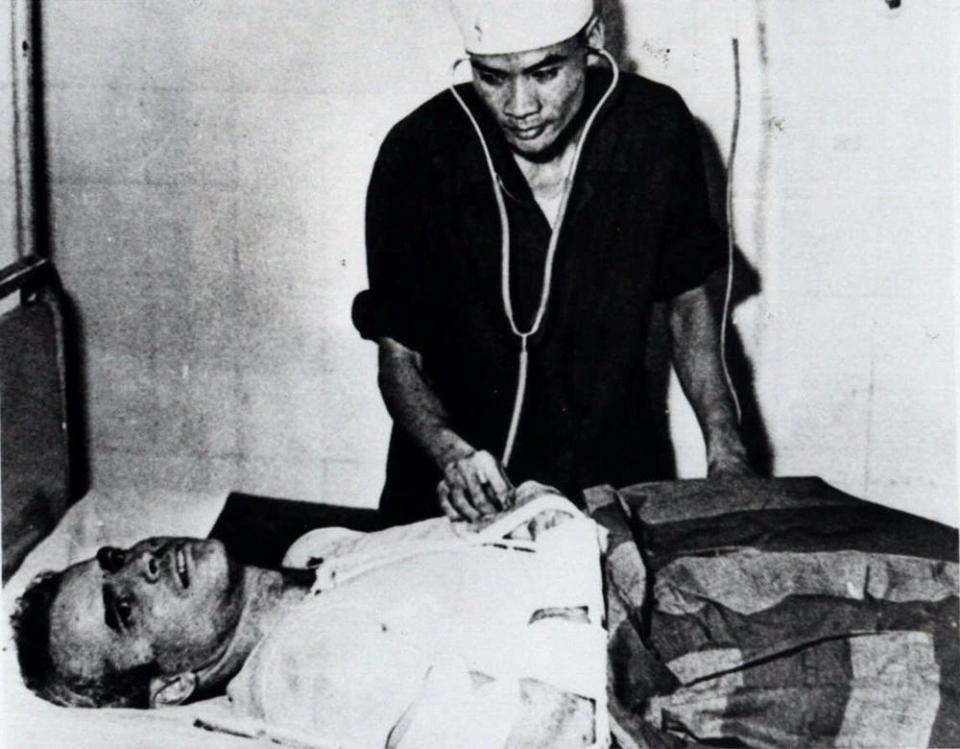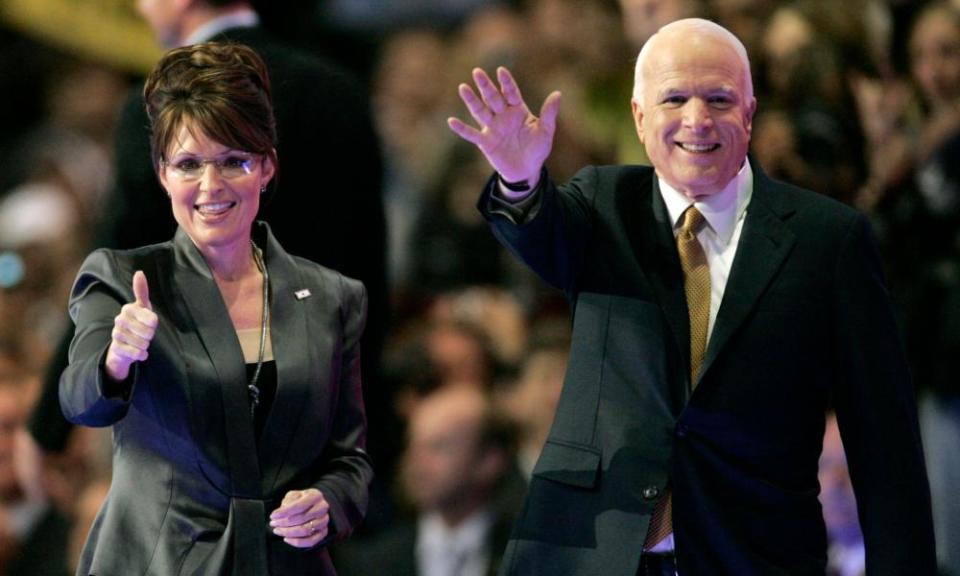John McCain: 10 moments that will shape the senator's legacy
The Arizona senator saw himself as a maverick, whose career was defined by the times he lived up to his principles and by those times he didn’t

The Republican senator John McCain prided himself on being a “maverick”, a politician with a strong moral compass who was willing to buck his party and admit when he was wrong. He held himself, and everyone around him, to a high standard – one that he, by his own admission, fell short of on occasion.
Here is a collection of the moments – the courageous and the contradictory – that defined the extraordinary life of one of America’s most influential senators.
Refusing early release while a Vietnam prisoner of war

Before entering politics, McCain’s conduct as a prisoner of war in Vietnam ennobled him to the American public.
Less than a year into his captivity at the notorious “Hanoi Hilton”, McCain was abruptly offered an early release. But adhering to the POW code, under which officers were to accept release in the order they were captured, McCain refused.
“I knew that they wouldn’t have offered it to me if I hadn’t been the son of an admiral,” McCain told the Arizona Republican in 2007. “I just didn’t think it was the honorable thing to do.”
He was beaten and tortured for his defiance. McCain was released in March 1973, after more than five years in prison.
Keating 5 involvement
In 1989, McCain was one of five US senators involved in an corruption scandal that nearly derailed his political career.
The senators were accused of pressuring federal regulators to back off an inquiry into their political benefactor Charles Keating, whose savings and loan enterprise went bankrupt in the late 1980s at a steep cost to taxpayers.
McCain was cleared of impropriety by a Senate ethics committee but faulted for “poor judgment”. The senator, who has called the affair “my asterisk” and a permanent “bad mark on my record”, would go on to champion campaign finance reform.
The Confederate flag
During his first campaign for president in 2000, McCain moderated his personal view when asked whether he believed the Confederate flag should be removed from the South Carolina state capitol.
He was facing a competitive primary there and believed that condemning the flag, as he had previously, would hurt his chances with Republican voters. He lost the race anyway.
In remarks later that year, McCain apologized for his lack of candor and invoked his Confederate ancestors, who, he said, “fought on the wrong side of American history”.
“I don’t believe their service, however distinguished, needs to be commemorated in a way that offends, that deeply hurts, people whose ancestors were once denied their freedom by my ancestors,” he said.
Sarah Palin: ‘the next vice-president of the United States’
On 29 August 2008, McCain stood in front of a large crowd in Dayton, Ohio and, upending expectations, introduced “the next vice-president of the United States, Governor Sarah Palin of the great state of Alaska”.
Critics say McCain’s decision to pick Palin as his running mate in the race against Barack Obama unleashed a Pandora’s Box of grievance politics within the Republican party that paved the way for the rise of Donald Trump.
“I don’t think he could have known it at the time but he took a disease that was running through the Republican party – anti-intellectualism, disrespect for facts – and he put it right at the center of the party,” the New York Times columnist David Brooks said in the HBO documentary about McCain’s life, For Whom the Bell Tolls.

In the film, McCain says he regrets not choosing Joe Lieberman, a friend and Democrat turned independent, to be his running mate. Yet he continues to defend Palin and does not engage with the criticism.
McCain defends Obama: ‘No ma’am’
In the waning days of the bruising 2008 presidential campaign, a supporter at a town hall in Minnesota told McCain she feared an Obama presidency because she heard the Democrat was an “Arab”. McCain reached for her microphone, his head shaking in disagreement.
“No ma’am, no ma’am,” McCain said as the conservative crowd booed the Republican nominee. “He’s a decent family man, citizen, that I just happen to have disagreements with on fundamental issues. That’s what this campaign is all about. He’s not [an Arab].”
McCain concedes to Obama
On 4 November 2008, the vanquished Republican presidential nominee graciously conceded the election to Barack Obama in front of thousands of supporters in Phoenix. In his speech, McCain congratulated Obama on his victory and called on the country to rally behind their newly elected leader. But he went further – acknowledging the historical importance of Obama’s election in a nation built on slavery and riven by racial divisions.
This is an historic election, and I recognize the special significance it has for African Americans and for the special pride that must be theirs tonight. I’ve always believed that America offers opportunities to all who have the industry and will to seize it. Senator Obama believes that, too. But we both recognize that though we have come a long way from the old injustices that once stained our nation’s reputation and denied some Americans the full blessings of American citizenship, the memory of them still had the power to wound.
A century ago, President Theodore Roosevelt’s invitation of Booker T Washington to visit – to dine at the White House – was taken as an outrage in many quarters. America today is a world away from the cruel and prideful bigotry of that time. There is no better evidence of this than the election of an African American to the presidency of the United States. Let there be no reason now for any American to fail to cherish their citizenship in this, the greatest nation on Earth.
Senator Obama has achieved a great thing for himself and for his country.”
‘Danged fence’ and immigration reform
It was a 30-second spot aimed at deflating attacks on a conservative challenger that McCain, after years of pushing for immigration reform, was soft on the border.
But the 2010 campaign commercial, in which McCain walks the southern border and vows to build the “danged fence”, would become a case study for critics in how the “maverick” – once willing to buck his party on matters of principle was gone. The ad drew ridicule and parody.
Critics accused him of political opportunism and abandoning a career-long campaign for bipartisanship on immigration.
McCain easily won his primary and would resume a more centrist position on immigration in the aftermath.
Defense of the release of the torture report
McCain aggressively defended the controversial decision to release the 2014 Senate report on torture, which detailed interrogation techniques used by the CIA after the 9/11 attacks. The report disclosed major revelations about the agency’s torture practices, including that they were more brutal than previously known.
McCain, who was tortured as a prisoner of war in Vietnam, worked across the aisle to ensure the report was released.
I believe the American people have a right – indeed, a responsibility – to know what was done in their name; how these practices did or did not serve our interests; and how they comported with our most important values,” McCain said in a speech on the Senate floor.
The truth is sometimes a hard pill to swallow. It sometimes causes us difficulties at home and abroad. It is sometimes used by our enemies in attempts to hurt us. But the American people are entitled to it, nonetheless.”
Thumbs down on the healthcare vote
The hour was late. The vote was tied. America’s healthcare system hung in the balance, when McCain, rebuffing an 11th-hour appeal from the president, turned his thumb down, killing his own party’s years-long effort to repeal Barack Obama’s Affordable Care Act.
McCain had threatened to oppose the plan if Republicans did not follow “regular order” and allow the legislation to receive a hearing and input from Democrats.
In a speech ahead of the vote, McCain urged the Senate to return to break its cycle of gridlock and work together on the major issues.
What have we to lose by trying to work together to find those solutions? We’re not getting much done apart. I don’t think any of us feels very proud of our incapacity. Merely preventing your political opponents from doing what they want isn’t the most inspiring work. There’s greater satisfaction in respecting our differences, but not letting them prevent agreements that don’t require abandonment of core principles, agreements made in good faith that help improve lives and protect the American people.
The Senate is capable of that. We know that. We’ve seen it before. I’ve seen it happen many times. And the times when I was involved even in a modest way with working out a bipartisan response to a national problem or threat are the proudest moments of my career, and by far the most satisfying.”
McCain condemns “half-baked spurious nationalism”
McCain has been one of the leading Republican antagonists of the Trump presidency.
As a candidate, Trump said he did not consider McCain a war hero and that he prefers “people who weren’t captured”. As president, Trump has continued to disparage McCain for his healthcare vote.
McCain has watched in dismay as Trump steers the party towards his “America First” policies while disparaging allies and embracing adversaries, including Russian president Vladimir Putin, a longtime foe of the senator. He has clashed with the president on immigration, refugee policy and torture.
In a speech to accept the 2017 Liberty Medal Award, McCain defended the values that he has long championed and which he believes are threatened by Trump’s populist rise.
To fear the world we have organized and led the three-quarters of a century, to abandon the ideals we have advanced around the globe, to refuse the obligations of international leadership and our duty to remain “the last best hope of earth” for the sake of some half-baked, spurious nationalism cooked up by people who would rather find scapegoats than solve problems, is as unpatriotic as an attachment to any other tired dogma of the past that Americans consigned to the ash heap of history.
We live in a land made of ideals, not blood and soil. We are the custodians of those ideals at home, and their champion abroad. We’ve done great good in the world. That leadership has had its costs, but we have become incomparably powerful and wealthy as we did.
We have a moral obligation to continue in our just cause, and we would bring more than shame on ourselves if we don’t. We will not thrive in a world where our leadership and ideals are absent. We wouldn’t deserve to.
I’m the luckiest guy on earth. I have served America’s cause – the cause of our security and the security of our friends, the cause of freedom and equal justice – all my adult life. I haven’t always served it well. I haven’t even always appreciated what I was serving.
But among the few compensations of old age is the acuity of hindsight. I see now that I was part of something important that drew me along in its wake even when I was diverted by other interests. I was, knowingly or not, along for the ride as America made the future better than the past.

